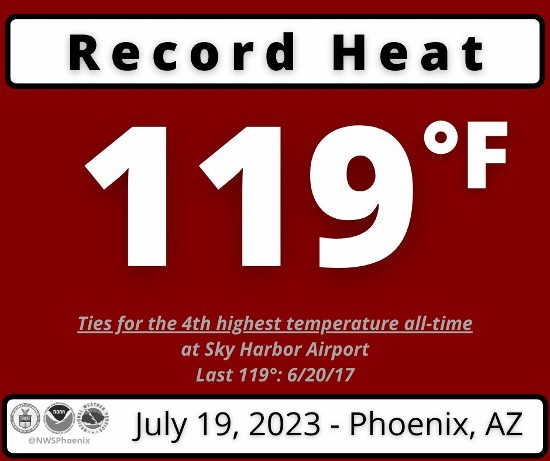Water off Florida’s southern tip hit 38+ Celsius (101 Fahrenheit) in July. Mediterranean countries saw daytime temperatures exceed 40 Celsius (104 Fahrenheit). In Iran, the country closed down for several days to protect the population from extreme daytime temperatures. The South Pacific El Niño this year will raise ocean surface temperatures by more than 0.8 Celsius (1.4 Fahrenheit), above the long-term average of 0.5 Celsius (0.9 Fahrenheit).
The climatologists and weather people who measure Earth’s temperatures informed the general public that this past July was hotter than any previous month on Earth since humans began keeping temperature records. Four 4 out of 5 on the planet experienced warming affecting 6.5 billion on one or more days during the month.
Atmospheric heat never experienced before was recorded from the U.S. Southwest to China. Of 4,711 reporting cities across the planet, 4,019 noted that July was the hottest month ever experienced by them.
António Guterres, United Nations Secretary-General announced, “The era of global boiling has arrived.” One can forgive Guterres for the hyperbole since he has been calling for the nations of the world to take global warming seriously for as long as I can remember.
What are climate scientists concluding from what is being observed?
These higher temperatures and unusual weather patterns leading to unseasonal wildfire outbreaks, monsoon-like deluges that cause inland and coastal flooding, and more powerful hurricanes (typhoons or cyclones depending on which oceans you are in) align with current climate models that continue to improve in terms of accurate predictive capability.
Climatologists have been modelling the climate for more than 50 years. It appears that current real-time data collection, computers, and artificial intelligence have produced long-term forecasts that are coming true.
But what climatologists are saying is rather interesting. They conclude that predictions of unpredictability are coming true and moving the planet in a dangerous direction leading to climate instability. Climate scientist, Claudia Tebaldi of the Pacific Northwest National Laboratory, notes that “we need to be ready for more surprising behaviour.”
Should all of us be worried about our climate future? Is the 1.5 Celsius (2.7 Fahrenheit) rise in mean atmospheric temperature about to breach leading to climate tipping points?
Interesting comments from James Skea, who is now heading up the United Nations’ IPCC (Intergovernmental Panel on Climate Change), believes we may be overstating the climate crisis.
In an interview with Der Spiegel, the German news weekly, Skea states “We should not despair and fall into a state of shock…If you constantly communicate the message that we are all doomed to extinction, then that paralyzes people and prevents them from taking the necessary steps to get a grip on climate change.”
Skea acknowledges that we are headed in a dangerous direction but notes, “The world won’t end if it warms by more than 1.5 degrees.” Skea is a physicist whose doctoral thesis was on energy research. He’s not a climatologist. Why he heads up the IPCC is beyond my understanding.
But it should be no surprise with his background he believes the way out of the climate mess is to use technology, and in particular carbon capture and storage (CCS) to reverse global warming.
Skea notes that as individuals we can change our behaviour but that no scientist should be telling people how to live or what to eat. I wonder what my doctor would say to that.
Instead, Skea wants the IPCC to do less “doom and gloom reporting” and more positive activities to advise city and town planners, landowners and businesses. He states, “With all these things it’s about real people and their real lives, not scientific abstractions. We need to come down a level.”
In other words, Skea wants climatologists to cool the rhetoric and get governments and businesses to start spending money on climate fixes. I wonder if the energy industry is all in on Skea’s narrative of business action. From my perspective and the research and reporting I have done for the last 14 years, I don’t think the industry most responsible for global warming is on the same page. Fossil fuel companies continue to drag their feet and at every opportunity ask for government subsidies and handouts. These include public funds to support CCS projects, the kind of projects this same industry has bailed out from repeatedly leaving public debt and facilities never built or unfinished.
So what’s predictable in all this? Those who speak from energy interests continue to be predictable even when they are heading up the IPCC. And unpredictability is very much what we are living with today and will be in the future.









